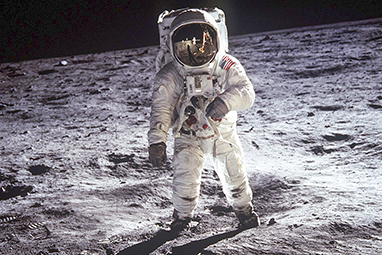SPARTANBURG, S.C. – The lecture of former astronaut Buzz Aldrin, the second person to walk on the moon and the lunar module pilot on Apollo 11, the first manned lunar landing in history, will be webcast live at 7 p.m. Tuesday, March 4, from Wofford College’s Leonard Auditorium in Main Building.
Aldrin’s lecture about his moon walk, other space experiences and his vision for Mars exploration is free and open to the public. Seating for the event will be on a first-come, first-serve basis. Doors will open at 6 p.m. (General public parking will be available in parking lots off Evins Street on the north side of campus from North Church Street.)
Overflow seating with access to a video feed of the lecture will be available if necessary in classrooms in Main Building.
A link to the live webcast – available to anyone anywhere with a computer – will be made available on the Wofford website on Tuesday before the lecture. It will be linked from the home page – and from the Wofford Newsroom page. (This page will not be live until Tuesday.) The webcast will be free and no registration will be required. View the webcast of Buzz Aldrin.
Aldrin’s lecture is part of the endowed Hipp Lecture Series on International Affairs and National Security, which also sponsored the November 2011 Republican Presidential Candidates Debate on campus.
“Buzz Aldrin is a friend and someone I’ve admired for many years,” says Wofford alumnus Van D. Hipp Jr., who established the lecture series. “He is truly a national treasure and a real American hero. We are honored to have him come to Wofford, meet with students and participate in the lecture series.”
Aldrin, a native of Montclair, N.J., is a graduate of the U.S. Military Academy at West Point. In the U.S. Air Force, he flew F86 Sabre jets in 66 combat missions in Korea, shot down two MIG-15s and was decorated with the Distinguished Flying Cross. After a tour of duty in Germany flying F100s, he earned his doctor of science in astronautics at MIT and wrote his thesis on manned orbital rendezvous.
Selected by NASA in 1963 into the third group of astronauts, Aldrin was the first with a doctorate and became known as “Dr. Rendezvous.” The docking and rendezvous techniques he devised for spacecraft in Earth and lunar orbit became critical to the success of the Gemini and Apollo programs and are still used today.
Aldrin also pioneered underwater training techniques, as a substitute for zero-gravity flights, to simulate spacewalking.
On Nov. 11, 1966, he and command pilot James Lovell launched on Gemini 12, the last flight of the Gemini program, on a four-day mission. During the flight, Aldrin set a new record for spacewalking, spending more than five hours outside the spacecraft.
On July 20, 1969, Aldrin and Neil Armstrong made their historic Apollo 11 moonwalk, becoming the first two humans to set foot on another world. They spent 21 hours on the lunar surface and returned with 46 pounds of moon rocks. An estimated 600 million people – at the time, the world’s largest television audience in history – witnessed this unprecedented heroic endeavor.
After returning from the moon, Aldrin was decorated with the Presidential Medal of Freedom, the highest American peacetime award.
Since retiring from NASA and the Air Force, Aldrin has remained at the forefront of efforts to ensure America’s continued leadership in human space exploration. He devised a master plan for missions to Mars, known as the “Aldrin Mars Cycler.” He has received three U.S. patents for his schematics of a modular space station, Starbooster reusable rockets, and multi-crew modules for space flight.
Aldrin founded Starcraft Boosters Inc., a rocket design company, and the ShareSpace Foundation, a nonprofit devoted to advancing space education, exploration and affordable space flight experiences for all.
In November 2011, Aldrin received the Congressional Gold Medal, the nation’s highest civilian honor, along with other Apollo 11 crew members Neil Armstrong and Michael Collins, and Mercury Seven astronaut John Glenn, for their significant contribution to society and blazing the trail of exploration.
Aldrin is the author of eight books, including his New York Times best-selling autobiography “Magnificent Desolation,” released in 2009. His newest book is “Mission to Mars: My Vision for Space Exploration,” published in May 2013.
The founder of the Hipp Lecture Series on International Affairs and National Security, Van D. Hipp Jr., a former chairman of the South Carolina Republican Party, now is chairman of American Defense International Inc. in Washington, D.C., and is on the board of directors of the American Conservative Union and the National Capital Board of the Salvation Army. He is the former deputy assistant secretary of the U.S. Army, where he oversaw the bulk of the mobilization for Operation Desert Storm.
Buzz Aldrin lecture to be webcast live from Wofford
Event at 7 p.m. Tuesday, March 4, in Leonard Auditorium